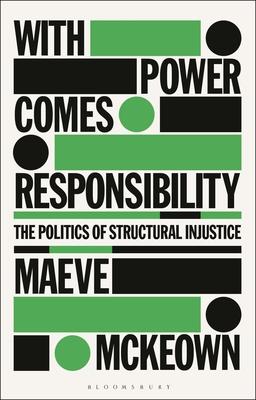What is structural injustice, and who ultimately bears responsibility for it? In answering these questions Maeve McKeown goes beyond the widely accepted narrative of unintended consequences and blameless participation to explain how power and responsibility truly function in today's world.
Drawing on case studies from sweatshops to climate change, McKeown identifies three types of structural injustice: the pure and unintended accumulation of disparate activities; the avoidable injustice that could be ameliorated by the powerful but nevertheless continues; the deliberate perpetuation of structural processes that benefit powerful political and economic agents. In each of these, the role of power is different which changes the allocation of responsibility. From this understanding, we can shape a deeper, more sophisticated idea of how structural injustice operates and what we as individuals can do about it. What is the political responsibility of ordinary individuals? How can ordinary individuals with very little power pressure morally responsible, powerful agents to address structural injustice? Do we have the same responsibility for historical injustice as we do for that which we see in today's world? This is fundamental reassessment of the relationship between power, ordinary people and responsibility for structural injustice.
Book
With Power Comes Responsibility: The Politics of Structural Injustice
(Write a Review)
Hardcover
$100.00
What is structural injustice, and who ultimately bears responsibility for it? In answering these questions Maeve McKeown goes beyond the widely accepted narrative of unintended consequences and blameless participation to explain how power and responsibility truly function in today's world.
Drawing on case studies from sweatshops to climate change, McKeown identifies three types of structural injustice: the pure and unintended accumulation of disparate activities; the avoidable injustice that could be ameliorated by the powerful but nevertheless continues; the deliberate perpetuation of structural processes that benefit powerful political and economic agents. In each of these, the role of power is different which changes the allocation of responsibility. From this understanding, we can shape a deeper, more sophisticated idea of how structural injustice operates and what we as individuals can do about it. What is the political responsibility of ordinary individuals? How can ordinary individuals with very little power pressure morally responsible, powerful agents to address structural injustice? Do we have the same responsibility for historical injustice as we do for that which we see in today's world? This is fundamental reassessment of the relationship between power, ordinary people and responsibility for structural injustice.Hardcover
$100.00